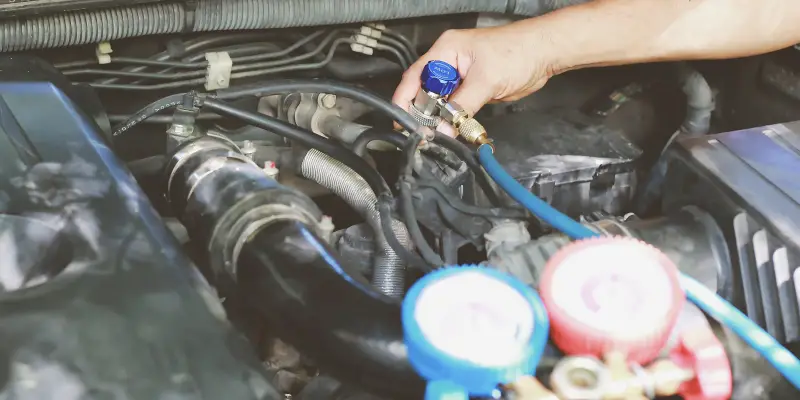Summer is just around the corner, and the last thing you want is to be stuck in a hot car with a malfunctioning air conditioner. A non-functioning car air conditioner can turn your daily commute into a sweaty and uncomfortable experience. Fortunately, there are several potential reasons why your car’s AC might not be working, and several steps you can take to diagnose and fix the issue.
Potential Causes of a Non-Functioning Car Air Conditioner
Before you can fix a malfunctioning car air conditioner, you need to understand the potential reasons behind the issue. Some common causes of a non-functioning car air conditioner include:
| Cause | Description |
|---|---|
| Refrigerant Leak | If your car’s AC system is low on refrigerant, it may not work properly. Refrigerant leaks can occur over time or due to damage to the AC system. |
| Electrical Issues | Faulty wiring or electrical components can prevent the air conditioner from turning on or may cause it to shut off unexpectedly. |
| Broken Compressor | The compressor is a vital component of the AC system. If it’s damaged or worn out, the air conditioner may not function correctly. |
| Bad Blower Motor | The blower motor is responsible for circulating cool air through the vents. If it’s malfunctioning, you may not feel any cool air inside the car. |
| Clogged or Blocked Condenser | A clogged or blocked condenser can impede the flow of refrigerant and prevent the air conditioner from cooling the air. |
Diagnosing and Fixing the Issue
When your car’s AC isn’t working, it’s essential to diagnose the problem and take steps to fix it. Here are some steps to take:
- Check the Refrigerant Level: Use a refrigerant pressure gauge to check the refrigerant level in the AC system. If it’s low, you likely have a leak that needs to be repaired.
- Inspect for Leaks: Look for signs of refrigerant leaks, such as oily residue around AC components. If you spot a leak, it’s crucial to have it repaired by a professional.
- Test the Electrical Components: Use a multimeter to check the electrical connections and components of the AC system for any faults or issues.
- Examine the Compressor: Check the compressor for any signs of damage or wear. If it’s faulty, it may need to be replaced by a qualified mechanic.
- Inspect the Blower Motor: Test the blower motor to ensure it’s functioning correctly. If not, it may need to be repaired or replaced.
- Clean the Condenser: Inspect the condenser for any obstructions or debris and clean it thoroughly to ensure proper airflow.
When to Seek Professional Help
While some car AC issues can be diagnosed and fixed by a DIY enthusiast, there are times when it’s best to seek professional help. If you’re unable to identify the underlying cause of the problem, or if the necessary repairs are beyond your skill level, it’s essential to take your car to a qualified mechanic or auto technician. They have the expertise and tools to diagnose and repair complex AC issues effectively.
Furthermore, working with a professional ensures that the repairs are carried out safely and in compliance with manufacturer specifications. Attempting complex AC repairs without the necessary knowledge and experience can lead to further damage and safety hazards.

Credit: www.tedshvacservice.com
Preventative Maintenance for Your Car’s Air Conditioner
Just like any other component of your car, regular maintenance is key to keeping your air conditioner in top-notch condition. Here are some preventative maintenance tips:
- Regular Inspections: Have your car’s AC system inspected regularly by a qualified technician to detect and address any potential issues before they become major problems.
- Replace the Cabin Air Filter: A clogged or dirty cabin air filter can restrict airflow and strain the AC system. Replace it at the recommended intervals.
- Run the AC System Regularly: Even in the cooler months, run your car’s AC system for a few minutes to keep the components lubricated and prevent malfunctions.
- Keep the Condenser Clean: Regularly inspect and clean the condenser to prevent dirt and debris from obstructing airflow.
Conclusion
A malfunctioning car air conditioner can make your driving experience uncomfortable, especially during the hot summer months. By understanding the potential causes of AC issues and following the steps to diagnose and fix the problem, you can ensure that your car’s AC system keeps you cool and comfortable on the road. Remember, when in doubt, it’s always best to consult with a professional to address complex AC issues and ensure the safety and performance of your vehicle.

